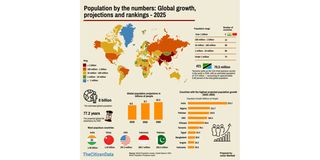Prime
Population growth a golden economic opportunity for Tanzania, experts say

What you need to know:
- Tanzania’s population is expected to increase by 59 million between 2025 and 2050, reaching 129 million.
- This translates to an average annual growth of 2.4 million people, underscoring the country’s high population momentum.
Dar es Salaam. As Tanzania joins the world in marking World Population Day today (July 11), experts say the country’s rapidly growing population presents a potential economic advantage if properly harnessed.
According to World Population Review data, Tanzania’s population is expected to increase by 59 million between 2025 and 2050, reaching 129 million. This translates to an average annual growth of 2.4 million people, underscoring the country’s high population momentum.

Experts, however, stress that this growth should not be seen as a threat, but rather as an opportunity—provided it is accompanied by strategic investment in human capital and infrastructure.
Professor Jehovaness Aikaeli from the University of Dar es Salaam’s Department of Economics told The Citizen that a large population can be a powerful asset when citizens are given the right tools, skills and opportunities to be productive.
“Countries like China and India, despite their large populations, have become global economic players because they have invested in their people and turned their populations into productive contributors,” he said. He added that population growth should not be feared, but rather planned for through increased public awareness and responsible family planning.
“Families should be encouraged to have children based on their economic capacity. At the same time, the government must create strong policy frameworks that support education, healthcare and job creation,” Prof Aikaeli said.
Mr Samweli Msokwa, Programme Manager for Population and Development at the United Nations Population Fund (UNFPA), echoed similar sentiments. He emphasised that population growth must be matched by investment in social services and individual well-being.
“This year’s World Population Day theme—‘Empowering young people to create the families they want in a fair and hopeful world’—is timely. It speaks directly to the challenges and aspirations of young people and women both in Tanzania and globally,” he said.
He pointed out that the productivity of individuals depends on the quality of foundations laid during childhood and youth. “What matters most is how productive people are. That requires long-term investment in their development,” he added.
In a statement, UNFPA Executive Director Dr Natalia Kanem said there is growing global anxiety around demographic trends, including declining fertility rates, ageing populations and workforce shortages. At the same time, fears over overpopulation persist.
“The real fertility crisis is the lack of reproductive agency. Young people are often unable to create the families they want, yet are blamed for declining birth rates,” she said.
Dr Kanem noted that financial insecurity, global conflicts, health concerns, and climate change are among the key reasons many young people delay or limit childbearing.
“Let’s listen to what young people want and create conditions that enable them to make informed choices, exercise their rights, and build a future they hope for,” she urged.



